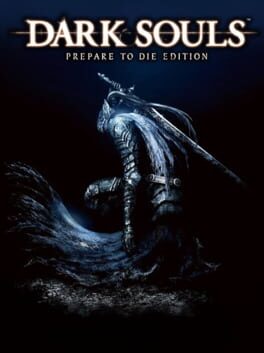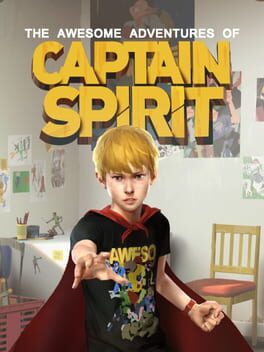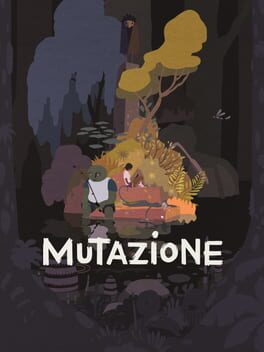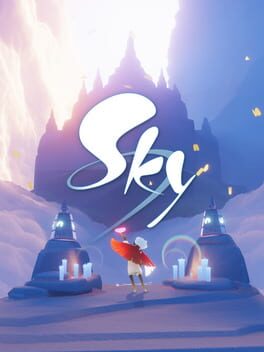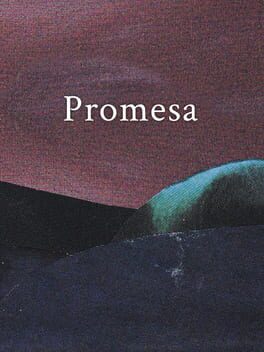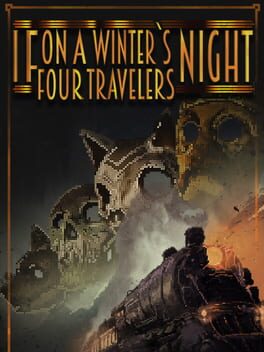Felloboard
11 reviews liked by Felloboard
Cocoon
2023
It's quite beautiful to make a game with this much interactivity with a singular button. Puzzles feel good, look good, and are very digestible without being solved at first glance. I feel like puzzle games kinda struggle with a good balance between rocket surgery and square block goes into square hole, but this strikes it nicely.
I'm kinda missing a point to it all? It's like this was a project to explore interactivity, which I guess is fine on its own, but it's just a bit wasted potential to be this immersed and only end up thinking about button presses. Kinda feels like I just had sex for 6 hours without cumming? Like it's nice and all, but.. I like cumming
I'm kinda missing a point to it all? It's like this was a project to explore interactivity, which I guess is fine on its own, but it's just a bit wasted potential to be this immersed and only end up thinking about button presses. Kinda feels like I just had sex for 6 hours without cumming? Like it's nice and all, but.. I like cumming
Death Stranding
2019
Hay un instante en esta demo gratuita pensada como promoción de la segunda parte de Life Is Strange que vale más que todo el videojuego original.
Encarnas a Chris, un crío de diez años que se refugia en su imaginación (el chaval se cree superhéroe) como escapatoria a la realidad traumática de vivir con un padre maltratador. Juegas haciendo las tareas de casa que tu padre, borracho, deja para luego o se niega a hacer o delega en ti, y para no hundirte en la miseria te imaginas que las haces usando superpoderes.
El momento del que hablo llega al final, cuando una mujer sospecha acerca de la situación y decide acercarse a la casa para comprobar el asunto. Al abrirle la puerta, deja caer que si alguna vez estás asustado o lo que sea puedes acudir a ella. Lo especial aquí es que, cuando esto ocurre, el jugador se posiciona emocionalmente con el padre, temiendo que la señora descubra lo que pasa y esperando que se marche pronto y sin causar problemas. Pasa que, antes de llegar a esta secuencia, mientras deambulamos por la casa a medio camino entre el curiosear y los quehaceres, aprendemos cosas sobre el padre y el estado familiar, de tal modo que llegamos a interiorizar (y entender) cómo ha podido acabar torciéndose la dinámica hasta el punto de vivir con un padre maltratador.
Imagino que habrá quien interprete esto como suavizar o incluso justificar el maltrato, pero yo creo que lo importante aquí es cómo el juego le lleva a uno a ponerse en la piel del protagonista hasta el punto de implicarle emocionalmente con el supuesto villano, comprendiendo que la realidad no es tan sencilla y que los problemas vienen de alguna parte y son difíciles de resolver.
Encarnas a Chris, un crío de diez años que se refugia en su imaginación (el chaval se cree superhéroe) como escapatoria a la realidad traumática de vivir con un padre maltratador. Juegas haciendo las tareas de casa que tu padre, borracho, deja para luego o se niega a hacer o delega en ti, y para no hundirte en la miseria te imaginas que las haces usando superpoderes.
El momento del que hablo llega al final, cuando una mujer sospecha acerca de la situación y decide acercarse a la casa para comprobar el asunto. Al abrirle la puerta, deja caer que si alguna vez estás asustado o lo que sea puedes acudir a ella. Lo especial aquí es que, cuando esto ocurre, el jugador se posiciona emocionalmente con el padre, temiendo que la señora descubra lo que pasa y esperando que se marche pronto y sin causar problemas. Pasa que, antes de llegar a esta secuencia, mientras deambulamos por la casa a medio camino entre el curiosear y los quehaceres, aprendemos cosas sobre el padre y el estado familiar, de tal modo que llegamos a interiorizar (y entender) cómo ha podido acabar torciéndose la dinámica hasta el punto de vivir con un padre maltratador.
Imagino que habrá quien interprete esto como suavizar o incluso justificar el maltrato, pero yo creo que lo importante aquí es cómo el juego le lleva a uno a ponerse en la piel del protagonista hasta el punto de implicarle emocionalmente con el supuesto villano, comprendiendo que la realidad no es tan sencilla y que los problemas vienen de alguna parte y son difíciles de resolver.
Mutazione
2019
— ¿Sabes cómo salir?
— Juntos
He quedado prendado de lo sencillo que es Mutazione. De las pocas vueltas que le busca a las cosas a pesar de su tono místico y ocultista. Sin comerlo ni beberlo, Kai -la joven que controlamos- se convierte en el apoyo y enlace de todos los miembros de una comunidad a la que acaba de llegar y que no pasa por el mejor de sus momentos. Todos ellos vierten en nosotros sus preocupaciones, dolores o alegrías y nuestra mera presencia les ayuda a avanzar. Mientras, sanamos a la isla y sus habitantes a través de naturaleza y música. Esto es lo que hay, y el conjunto fluye de tal manera que en ningún momento es necesario buscarle tres pies al gato.
Mutazione exuda tal naturalismo que no te das cuenta de que todos los sonidos que escuchas durante tus paseos por la isla se funden entre brisas que acarician la hierba, agitan las hojas y se funden con el discurrir de un riachuelo. Y entonces llega la noche del concierto, con sus guitarras y música artificial, y caes en la cuenta de lo prodigioso de la banda sonora ambiental que te acompaña en los momentos de “silencio”.
Esto, lo macro y a veces casi imperceptible, funciona como terreno fértil para sembrar la semilla de los momentos y conversaciones que vivimos en nuestra semana en la isla de Mutazione. Los cuales son potentísimos. Cuando alguien que vive un momento de profunda catarsis se queda sin palabras y decide darte un beso en la mejilla y unas gracias sin saber muy bien qué has hecho para merecerlas o cuando la solución a un lío amoroso con un hijo bastardo de por medio es cuidar a ese niño en comunidad; sabes que estás ante algo especial.
Estos y tantos otros son los instantes que me hacen sentir en total comunión con este juego. Cada vez estoy más convencido de que la humanidad -como atributo-, al menos como yo la entiendo, parte de hacer la vida más fácil, llevadera y entretenida para la gente que nos rodea sin tener que quedarnos en el camino por ello. Y eso, ni más ni menos, es Mutazione.
Únicamente lamento las veces que se nos permite inmiscuirnos en las cosas más de lo necesario. Hay escenas a las que asistimos como mirones en las que queda claro que no deberíamos estar presentes. A Mutazione demasiadas veces le sobra un diálogo. Pero también le sobra calidez. Personas, con todo lo que ello conlleva, relaciones y naturaleza con la que convivir y sellar cicatrices.
— Juntos
He quedado prendado de lo sencillo que es Mutazione. De las pocas vueltas que le busca a las cosas a pesar de su tono místico y ocultista. Sin comerlo ni beberlo, Kai -la joven que controlamos- se convierte en el apoyo y enlace de todos los miembros de una comunidad a la que acaba de llegar y que no pasa por el mejor de sus momentos. Todos ellos vierten en nosotros sus preocupaciones, dolores o alegrías y nuestra mera presencia les ayuda a avanzar. Mientras, sanamos a la isla y sus habitantes a través de naturaleza y música. Esto es lo que hay, y el conjunto fluye de tal manera que en ningún momento es necesario buscarle tres pies al gato.
Mutazione exuda tal naturalismo que no te das cuenta de que todos los sonidos que escuchas durante tus paseos por la isla se funden entre brisas que acarician la hierba, agitan las hojas y se funden con el discurrir de un riachuelo. Y entonces llega la noche del concierto, con sus guitarras y música artificial, y caes en la cuenta de lo prodigioso de la banda sonora ambiental que te acompaña en los momentos de “silencio”.
Esto, lo macro y a veces casi imperceptible, funciona como terreno fértil para sembrar la semilla de los momentos y conversaciones que vivimos en nuestra semana en la isla de Mutazione. Los cuales son potentísimos. Cuando alguien que vive un momento de profunda catarsis se queda sin palabras y decide darte un beso en la mejilla y unas gracias sin saber muy bien qué has hecho para merecerlas o cuando la solución a un lío amoroso con un hijo bastardo de por medio es cuidar a ese niño en comunidad; sabes que estás ante algo especial.
Estos y tantos otros son los instantes que me hacen sentir en total comunión con este juego. Cada vez estoy más convencido de que la humanidad -como atributo-, al menos como yo la entiendo, parte de hacer la vida más fácil, llevadera y entretenida para la gente que nos rodea sin tener que quedarnos en el camino por ello. Y eso, ni más ni menos, es Mutazione.
Únicamente lamento las veces que se nos permite inmiscuirnos en las cosas más de lo necesario. Hay escenas a las que asistimos como mirones en las que queda claro que no deberíamos estar presentes. A Mutazione demasiadas veces le sobra un diálogo. Pero también le sobra calidez. Personas, con todo lo que ello conlleva, relaciones y naturaleza con la que convivir y sellar cicatrices.
Yes, I am indeed one of those shmucks to whom the unique online experience provided by Journey not only worked for but deeply had an effect on that still resonates to this day, so the prospects of a new TGC game acting as a spiritual sequel to it and iterating upon the design philosophy that defined that game and its artistic recognition was all game for me.
Sky's biggest issue is its familiarity. The new coat of paint does not do enough to disguise how big of a shadow Journey casts over it. Not only conveying its aesthetic and narrative through the same devices and mechanics as its predecessor, it also ends up repeating many of Journey's most recognizable and memorable setpieces. What worked in Journey's more linear focused and intimate co-op design, now constantly disrupts the communial premise of Sky, frustratingly funneling you into a rollercoaster towards the finish line with obtrusive cutscenes that undercut whatever human connection you manage to build. The result: a very impressive looking game that in its attempt to outmatch Journey's holistic expression, ends up falling into the same trap so many of its copycats do.
Getting past that first impression is not an easy pill to swallow, but once Sky is no longer rushing you, a new game presents itself. Brimming with nooks and crannies and secret optional areas to find, Sky is a co-operative BOTW like experience of discovery unlike anything out there. The simple act of offering a candle to another player to be allowed to see their appearance and communicate with them alone invites interaction and dialogue, and with Journey's two player limit now gone, Sky is filled with players flying past and around you, ocasionally allowing for the small bit of limited interaction before parting ways never to be seen again. Finding myself holding hands with newbies to show them where to go, having the rare occasional small chat with people from different nationalities who speak in broken english, and demonstrating my gratitude towards a helpful hand by shooting fireworks around them, it becomes hard not to feel some speck of humanity twinge inside this decrepid jaded body.
It's a shame Sky feels the need to worship Journey so much, when its minimalist MMO design is more than enough to stand on its own, removing much of the excess I have so much trouble getting past in the genre. Spending hours with a group of strangers trying to open a door, filling up the time with whatever ways we could come up with to be entertained, only to be rewarded by one of the most underwhelming and yet hilarious secrets in the game, had me feeling a special sense of masochistic comradery, and as I watched each one of them say their goodbyes and part ways, knowing I would never see them again, I felt the same way I did when I missed the chance to reach out to that one stranger who died alongide me in Journey all those years ago. I made up my mind about Sky then.
Plus, hey, it's free.
Sky's biggest issue is its familiarity. The new coat of paint does not do enough to disguise how big of a shadow Journey casts over it. Not only conveying its aesthetic and narrative through the same devices and mechanics as its predecessor, it also ends up repeating many of Journey's most recognizable and memorable setpieces. What worked in Journey's more linear focused and intimate co-op design, now constantly disrupts the communial premise of Sky, frustratingly funneling you into a rollercoaster towards the finish line with obtrusive cutscenes that undercut whatever human connection you manage to build. The result: a very impressive looking game that in its attempt to outmatch Journey's holistic expression, ends up falling into the same trap so many of its copycats do.
Getting past that first impression is not an easy pill to swallow, but once Sky is no longer rushing you, a new game presents itself. Brimming with nooks and crannies and secret optional areas to find, Sky is a co-operative BOTW like experience of discovery unlike anything out there. The simple act of offering a candle to another player to be allowed to see their appearance and communicate with them alone invites interaction and dialogue, and with Journey's two player limit now gone, Sky is filled with players flying past and around you, ocasionally allowing for the small bit of limited interaction before parting ways never to be seen again. Finding myself holding hands with newbies to show them where to go, having the rare occasional small chat with people from different nationalities who speak in broken english, and demonstrating my gratitude towards a helpful hand by shooting fireworks around them, it becomes hard not to feel some speck of humanity twinge inside this decrepid jaded body.
It's a shame Sky feels the need to worship Journey so much, when its minimalist MMO design is more than enough to stand on its own, removing much of the excess I have so much trouble getting past in the genre. Spending hours with a group of strangers trying to open a door, filling up the time with whatever ways we could come up with to be entertained, only to be rewarded by one of the most underwhelming and yet hilarious secrets in the game, had me feeling a special sense of masochistic comradery, and as I watched each one of them say their goodbyes and part ways, knowing I would never see them again, I felt the same way I did when I missed the chance to reach out to that one stranger who died alongide me in Journey all those years ago. I made up my mind about Sky then.
Plus, hey, it's free.
Promesa
2020
Veo Promesa como un álbum musical en formato (mal llamado) walking simulator. Algo más de media hora de duración, dividido en escenas de pocos minutos cada una que además podemos rejugar por separado (y que en mi cabeza equivalen a canciones). Tan abiertamente personal y específico y opaco como tantos discos de rock, con esos diálogos entre escenas que bien podrían ser interludios entre canciones. Un álbum conceptual, eso sí. Técnicamente "sobre lo que ocurre cuando imaginamos cosas que no hemos vivido", según el propio autor, y también sobre la imposibilidad de vivir en tercera persona, de ponernos en la piel de otro al cien por cien, según yo. Ese imposible que es acceder a la memoria ajena a través de nuestra imaginación, con plena consciencia (y aquí el quid de la cuestión) de tal imposibilidad. Promesa no es la fantasía de acercarnos a la vida de una persona, ni de experimentar sus vivencias, sino la constatación de que tal cosa es una fantasía. No accedemos a momentos y lugares de la vida de alguien, sino al intento de un tercero, imaginación mediante, de hacerlo. Esa es la función de los diálogos previos a cada escena: de las palabras de otro, nuestra mezcla de imaginación y recuerdos para crear la visión posterior. Concretamente, de las palabras del ¿abuelo? de Julián, sus ensoñaciones como consecuencia. No somos él visitando la memoria de su abuelo mediante la magia de los videojuegos, sino el jugador asistiendo a su anhelo por hacerlo. Y todas esas trazas de ilusión (los cambios de estética, los objetos fantasma, el enrojecimiento...) así lo demuestran, pues evidencian la distancia entre realidad y ficción, que estas aparentes memorias están en realidad contaminadas por la imaginación. Que son una quimera.
Yo también dudé tras la primera partida, también pensé que algo no terminaba de cuajar. También creí que al ser sus símbolos tan personales el juego fracasaba a la hora de comunicarse con el jugador, y que sus elementos fantásticos funcionaban peor que los realistas porque eran contraproducentes de cara a la inmersión en una vida y lugar pretéritos. Lo estaba pensando como un libro, no como un disco. Pero tras volver a jugar comprendí que Promesa era una mezcla de memoria e imaginación, más específicamente una exploración de cómo nuestra imaginación interpreta y dialoga y fantasea con la memoria, en este caso ajena. No importa qué simboliza esa moto roja bajo la lluvia, ni a qué vienen esas casas de colores en la montaña, ni por qué hay un televisor allá en las nubes. Y no importa porque no se trata de entender la vida o el pasado del abuelo, sino de captar el anhelo del nieto, que no es sino el de ver lo que otros ojos, de sentir lo que otro corazón y comprender lo que otra mente. De saber cómo habría o habrá sido. Un anhelo inmenso, ese de querer saber cómo eran tus padres de jóvenes, qué vivieron y cómo veían el mundo, y de llegar incluso a hacer un esfuerzo en vano por imaginarlo. Un videojuego cualquiera nos hubiese colocado en la presunta localización precisa en el supuesto momento del tiempo exacto para que por ahí navegásemos a nuestro aire, con la información necesaria convenientemente esparcida para ser adquirida. Hubiese presentado la fantasía sin la distancia. No hubiese distinguido tanto los aspectos realistas de los fantásticos, ni hubiese controlado y limitado tanto (con gusto exquisito, por cierto) cómo atravesamos sus espacios, ni sería tan opaco en sus significados. Este es un videojuego profundamente triste, un quiero y no puedo nivel íntimo. Saber, al cien por cien, que todo lo vivido por el abuelo de Julián se ha perdido y que él no puede remediarlo, tan solo imaginar desde la incerteza. Aunque, por otra parte, quizá este memento mori que es Promesa le haya valido a su autor para, en cierta forma, homenajear esa vida, y en el proceso expiar ese anhelo del que ahora nosotros, como jugadores, somos un poco partícipes.
Yo también dudé tras la primera partida, también pensé que algo no terminaba de cuajar. También creí que al ser sus símbolos tan personales el juego fracasaba a la hora de comunicarse con el jugador, y que sus elementos fantásticos funcionaban peor que los realistas porque eran contraproducentes de cara a la inmersión en una vida y lugar pretéritos. Lo estaba pensando como un libro, no como un disco. Pero tras volver a jugar comprendí que Promesa era una mezcla de memoria e imaginación, más específicamente una exploración de cómo nuestra imaginación interpreta y dialoga y fantasea con la memoria, en este caso ajena. No importa qué simboliza esa moto roja bajo la lluvia, ni a qué vienen esas casas de colores en la montaña, ni por qué hay un televisor allá en las nubes. Y no importa porque no se trata de entender la vida o el pasado del abuelo, sino de captar el anhelo del nieto, que no es sino el de ver lo que otros ojos, de sentir lo que otro corazón y comprender lo que otra mente. De saber cómo habría o habrá sido. Un anhelo inmenso, ese de querer saber cómo eran tus padres de jóvenes, qué vivieron y cómo veían el mundo, y de llegar incluso a hacer un esfuerzo en vano por imaginarlo. Un videojuego cualquiera nos hubiese colocado en la presunta localización precisa en el supuesto momento del tiempo exacto para que por ahí navegásemos a nuestro aire, con la información necesaria convenientemente esparcida para ser adquirida. Hubiese presentado la fantasía sin la distancia. No hubiese distinguido tanto los aspectos realistas de los fantásticos, ni hubiese controlado y limitado tanto (con gusto exquisito, por cierto) cómo atravesamos sus espacios, ni sería tan opaco en sus significados. Este es un videojuego profundamente triste, un quiero y no puedo nivel íntimo. Saber, al cien por cien, que todo lo vivido por el abuelo de Julián se ha perdido y que él no puede remediarlo, tan solo imaginar desde la incerteza. Aunque, por otra parte, quizá este memento mori que es Promesa le haya valido a su autor para, en cierta forma, homenajear esa vida, y en el proceso expiar ese anhelo del que ahora nosotros, como jugadores, somos un poco partícipes.
Elden Ring
2022
When Demon’s Souls released in 2009, I was going through a pretty hard crisis of faith regarding videogames. I had grown old enough to finally see their limits, the industry-imposed repetition and condescention in their design, the corners that have to be cut and padded. I blindly took the advice from a few raving cynics I aligned myself with and imported Demon’s Souls from America as a last shot before I defiantly moved on from the medium like the little drama queen I was. DeS was exactly the game I needed, I had never played anything else like it, I had my mind shattered by the way the bosses in the title weren’t so much battles as they were puzzle boxes - imposing small situations to solve, being asked to find the lone small thread that will make the beast unravel. It felt like a NeverEnding Story adventure or something, I loved it, I still do.
With every new Fromsoft game, Hidetaka Miyazaki takes the opportunity to twist the dial even further from Adventure Fantasy to Battle Fantasy, the focus becoming more oriented around a type of mechanisation I personally find diagnostic-feeling, much less fulfilling - stat optimising and gear building, rote memorisation of excruciatingly difficult boss movesets. Very disenchanting open world too; everything in every corner is there to make your character more powerful, a handful of “types” of dungeon/outpost, a truly memetic core routine that made me feel like I was just playing Genshin Impact. This is obviously just a preference thing, but you must forgive me for feeling a little left behind.
There is a lot beauty in Elden Ring’s world, if I had anyone to thank for giving me the desire to trudge through this game to the end, it’ll be the stellar art and design team. Some of the most stunning locales I’ve seen in a minute; I’m particularly fond of miquellas haligtree, crumbling farum azula, and even revisiting Radahn’s arena post-battle for a taste of what I’d personally hoped exploring Elden Ring’s open world would feel like. The monster designs are nuts too, some skirting the perfect balance between recognisable and grotesque to lend some genuine unease.
Elden Ring is a fantastic game, just not a game for me. It actually gives me a little tinge of sadness to play a Fromsoft title and be made to think “this reminds me of another game” so many times. I respect the player-hostility maximalism of the bosses and the dizzying open-endedness of character builds - and in all honestly, Elden Ring very clearly has some of the richest thematic storytelling across the Miyazaki platter right now - I would just rather watch people snap the game over their knee on Youtube than ever play this again.
With every new Fromsoft game, Hidetaka Miyazaki takes the opportunity to twist the dial even further from Adventure Fantasy to Battle Fantasy, the focus becoming more oriented around a type of mechanisation I personally find diagnostic-feeling, much less fulfilling - stat optimising and gear building, rote memorisation of excruciatingly difficult boss movesets. Very disenchanting open world too; everything in every corner is there to make your character more powerful, a handful of “types” of dungeon/outpost, a truly memetic core routine that made me feel like I was just playing Genshin Impact. This is obviously just a preference thing, but you must forgive me for feeling a little left behind.
There is a lot beauty in Elden Ring’s world, if I had anyone to thank for giving me the desire to trudge through this game to the end, it’ll be the stellar art and design team. Some of the most stunning locales I’ve seen in a minute; I’m particularly fond of miquellas haligtree, crumbling farum azula, and even revisiting Radahn’s arena post-battle for a taste of what I’d personally hoped exploring Elden Ring’s open world would feel like. The monster designs are nuts too, some skirting the perfect balance between recognisable and grotesque to lend some genuine unease.
Elden Ring is a fantastic game, just not a game for me. It actually gives me a little tinge of sadness to play a Fromsoft title and be made to think “this reminds me of another game” so many times. I respect the player-hostility maximalism of the bosses and the dizzying open-endedness of character builds - and in all honestly, Elden Ring very clearly has some of the richest thematic storytelling across the Miyazaki platter right now - I would just rather watch people snap the game over their knee on Youtube than ever play this again.
Asura's Wrath
2012
Asura's Wrath being the laughing stock of excessive QTE use during the 7th gen has become a bit of an unfair reputation, considering how little credit it tends to get for how successfully it actually manages to pull it off. Described as an "interactive anime" by the developers themselves, it is clear that the people behind this production knew what they were doing, using all the classic tropes and cliches that have turned shounen into such a successful venue for guys being dudes.
So well executed in fact, that soon you forget that you are for the most part just pressing button prompts as you watch long ass cutscenes of big muscle guy punching another big muscle guy. There is definitely an art to making visceral rage and violence this engaging and purposeful, emotions that the japanese have managed to perfect and capitalize on with animation for decades now, and Asura's Wrath pays tribute to that legacy in a grand display of revenge melodrama between gods that puts God of War to shame.
It's an escalation of every increasingly insurmountable odds that Asura inevitably bursts through with his fists, fury and will alone, surprassing the greatests of Platinum Games finales, and it's amazing what a few buttons can do to elevate a story that we have seen told countless times before to new heights of catharsis. The final boss (which is locked behind payed dlc, a decision that sits at the pantheon of bad Capcom ideas) gets his shit kicked in so hard that by that point you welcome those QTEs with open arms.
The bittersweet ending note of Asura's Wrath is wondering how much more amazing it would have been were it a real ass videogame.
So well executed in fact, that soon you forget that you are for the most part just pressing button prompts as you watch long ass cutscenes of big muscle guy punching another big muscle guy. There is definitely an art to making visceral rage and violence this engaging and purposeful, emotions that the japanese have managed to perfect and capitalize on with animation for decades now, and Asura's Wrath pays tribute to that legacy in a grand display of revenge melodrama between gods that puts God of War to shame.
It's an escalation of every increasingly insurmountable odds that Asura inevitably bursts through with his fists, fury and will alone, surprassing the greatests of Platinum Games finales, and it's amazing what a few buttons can do to elevate a story that we have seen told countless times before to new heights of catharsis. The final boss (which is locked behind payed dlc, a decision that sits at the pantheon of bad Capcom ideas) gets his shit kicked in so hard that by that point you welcome those QTEs with open arms.
The bittersweet ending note of Asura's Wrath is wondering how much more amazing it would have been were it a real ass videogame.
Across a dusky horizon, a locomotive barrels down ancient tracks. Bound for an uncertain destination, the train, unceasingly long and coughing out ephemeral emerald smog, trails endlessly through a desert purgatory. Aboard the perpetual line, a cargo of socialites and aristocrats mingle with paupers and vagrants. Obscured by bestial visages, the myriad travellers drown their bewilderment in expensive spirits and pleasantries, their questions and concerns hushed by the vices of high society.
In an unmarked car in the convoy, a young man, burdened by a biting malaise, confides in a weary passenger. With no memory of boarding the train, much less arriving at the platform, he stumbled through the car, remembering little more than his name, and the hours leading up to his faithful departure. This confusion would be understandable in the best of cases, but for the young man, the circumstances behind his sudden arrival left him particularly disturbed, for only moments ago had the man perished.
“If On A Winter’s Night, Four Travelers” lives through its depictions of death, both in the immediate present and in how it confronts the lives of our protagonists. Told through grim vignettes, “Four Travelers” tells the tale of people consumed by passion, anger, and grief, spiraling to a tragic conclusion, a slow-burn melancholy in the tradition of classical horror.
While this would be plenty interesting on its own, where the game really shines is in the art backing it: Talking about the story without discussing the uniquely evocative sprite work would be meaningless. Framed in an isometric lens, the game brings effervescent life to decadent mansions, mortifying dread to a hellish otherworld, and all-encompassing sorrow to a war-torn battlefield. The beauty used in depicting the morbid, morose and macabre is the lynchpin in “Four Travelers’” dreadful drama.
A stunning work packed into a fleeting runtime, “If On A Winter’s Night” is gorgeous, if not narratively well-trodden. An utter gem. Besides… it’s free. Incredibly hard not to recommend.
In an unmarked car in the convoy, a young man, burdened by a biting malaise, confides in a weary passenger. With no memory of boarding the train, much less arriving at the platform, he stumbled through the car, remembering little more than his name, and the hours leading up to his faithful departure. This confusion would be understandable in the best of cases, but for the young man, the circumstances behind his sudden arrival left him particularly disturbed, for only moments ago had the man perished.
“If On A Winter’s Night, Four Travelers” lives through its depictions of death, both in the immediate present and in how it confronts the lives of our protagonists. Told through grim vignettes, “Four Travelers” tells the tale of people consumed by passion, anger, and grief, spiraling to a tragic conclusion, a slow-burn melancholy in the tradition of classical horror.
While this would be plenty interesting on its own, where the game really shines is in the art backing it: Talking about the story without discussing the uniquely evocative sprite work would be meaningless. Framed in an isometric lens, the game brings effervescent life to decadent mansions, mortifying dread to a hellish otherworld, and all-encompassing sorrow to a war-torn battlefield. The beauty used in depicting the morbid, morose and macabre is the lynchpin in “Four Travelers’” dreadful drama.
A stunning work packed into a fleeting runtime, “If On A Winter’s Night” is gorgeous, if not narratively well-trodden. An utter gem. Besides… it’s free. Incredibly hard not to recommend.
